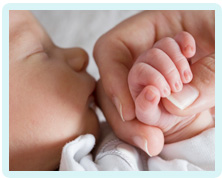
Poor 3rd Degree Tear Repair
Lexi underwent a repair for a 3A tear after the birth of her first child. She soon developed faecal incontinence, and it was eventually discovered that she had actually suffered a 3C tear. The defect in her anal sphincter had not been repaired, causing her ongoing incontinence.
When Lexi delivered her first baby, labour was complicated by the fact that the baby was lying back to back. A ventouse delivery was needed.
The delivering doctor diagnosed a third degree tear (Grade 3A) and rushed Lexi straight to theatre for a 2.5 hour repair. He performed an overlap repair of the external sphincter. She was given little other information about her injury and was discharged the following day.
In the months after the birth, Lexi found she was incontinent of urine. She was referred to a physiotherapist who recommended pelvic floor exercises.
However, by the time six months had passed, Lexi's bowel problems had become significantly worse. By now she was experiencing passive faecal incontinence and urgency once a week. Lexi was so embarrassed by her condition that she did not tell anyone. She thought it might be normal after childbirth and so tried to continue with her life as best as possible. This made things at work particularly hard.
Nearly two years after giving birth, Lexi attended her GP who referred her for more physiotherapy. This produced some improvement but both passive and urge incontinence continued. She was subsequently seen in the Perineal Clinic reporting problems of faecal incontinence. She was referred for a colorectal opinion and an endoanal ultrasound scan.
The results of these tests therefore indicated that Lexi's injury was more extensive than of 3A tear. As there was a full thickness external sphincter defect as well as an internal sphincter defect, this would indicate that she had a Grade 3C tear and not a 3A tear as diagnosed and repaired.
A Grade 3C tear of this size should have been identified by the registrar. Although a rectal examination was performed before and after the repair, the extent of the tear was not diagnosed.
Had a thorough rectal examination been performed, the 3C tear would have been diagnosed and repaired in the operating theatre. On the balance of probabilities, the repair would have been successful and Lexi's symptoms would have been avoided.
Lexi has undergone various methods of treatment but sadly she remains incontinent of faeces. This has had a terrible impact on her life.
We helped Lexi make a claim for the negligence she experienced. She was awarded in excess of £80,000 compensation.
(Details which might identify our client have been changed.)
Would You Like Assistance from Specialist Birth Injury Claims Solicitors?
If you would like to benefit from a service of excellence with total commitment to client care from a small and friendly team, Glynns are ready and waiting to help you.
Please call us on 0800 234 3300 (or from a mobile 01275 334030) or complete our Online Enquiry Form.



